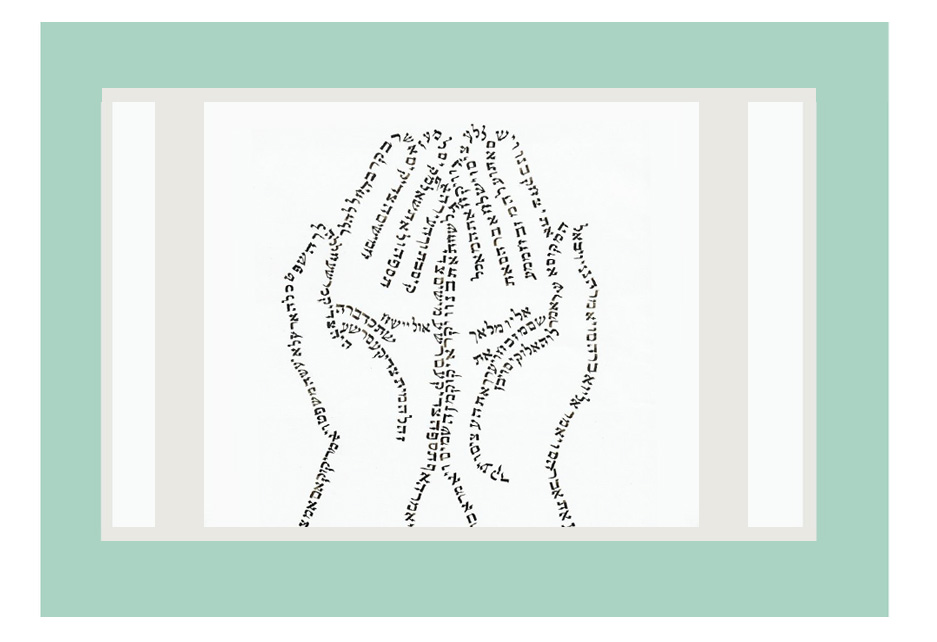Image: Cover art of “Our Still Small Voice” entitled “Suspension” by Ali Zak
This fall, a group of Jewish friends from across college campuses, geographies, and communities came together to create a fresh High Holidays reader for 5781 called “Our Still Small Voice” or Kol Damama Daka. This reader, in the form of a free-floating PDF, offers reflections, short stories, poetry, and teachings of compassion in a particularly difficult High Holiday season. If you like independently published collections, Jewish zines, or are looking for more ways to connect with awe-filled themes as we approach Yom Kippur and Sukkot, you can read and download “Our Still Small Voice” here.
In the bustle of a new school year filled with uncertainty and dislocation, it can be difficult to find a spiritual center — or even fully connect with the liturgy of Rosh Hashana and Yom Kippur. In this excerpt from “Our Still Small Voice”, Raffi Levi brings Jewish spiritual wisdom on enoughness and healing, Torah that he’s learned from friends and crafted into a list for readers looking to set an intention for the whirlwind of the Days of Awe.
12 Tips for Bringing Balance and Presence into the High Holidays (Based on the Teachings of Various Friends)
1. Maintain your mental health. If you are not feeling emotionally prepared, remember that your mental health is a priority, and that God wants us to be healthy. Don’t let your experience in prayer become a catalyst of anxiety. We must be prioritizers of life, having in mind the value of Pikuach Nefesh (preserving life). Sometimes fixating on listing your faults is not a healthy approach. We can stop, and think of something else, or perhaps we can think of the good even when reciting challenging liturgy. Remind yourself that the high holidays are centrally about choosing life (Uvacharta Bachaim).
2. Reconsider the sin-language in liturgy. We are a people with so many names for sin not only because of the complexity of sin, but because we are a people who keep mitzvot and understand the complexity of keeping them. We have many obligations and an often unclear redemption for when we mess up. Remember that the word “Chataah”, often translated as sin, is more likely closer to saying missing the mark, as the word is found in its context in the Tanach when King David misses the mark (chatah) while shooting an arrow. We also have many names for doing the right thing, such as Mitzvah (commandment), Chiyuv (obligation), Chessed (acts of kindness), Ahavah (acts of love). Beyond that, we have so many obligations that it makes sense we would try to cultivate a similar language about missing the mark as we do for obligation.
3. If you are present, you are already completely prepared. Be present with where you are at during your prayers. There is no reason to trouble yourself with the anxiety that you are who you think you must be. Teshuvah, or repentance, is also about returning to ourselves as we are, right now. It is about recognizing both our potential to do good and our human imperfectness. We can love ourselves and love the divine spark inside of us by being present. We need to remember that no matter where we are at that is a good place to be and validate that place! Do not worry, you are right where Hashem wants you to be, and whether or not you feel ready is okay because that is where you are at. There is no need to panic during prayer. To be calm and present should also improve your ability to focus.
4. We need to recognize the sins we made, but Teshuvah, repentance, is not a race. At the end of the day it is utterly important that we recognize we are flawed. If we pretend we are already perfect, perhaps we’ll never make changes. But our inconsistencies are also what make us real people, and we don’t need to change overnight. Just as God is described in the 13 attributes, “erech apaim”, fundamentally patient with us, we need to be fundamentally patient with ourselves and our growth. Try to see how you can improve on where you are at, without becoming disheartened by where you are. We hold the tension of being both fully whole and disparately broken, and we each must navigate this according to our ability.
5. It is more than enough if we become a basically good human, and to “follow” (however one defines this) basic halacha. There is no such thing as a perfect human, otherwise we would not be human. We are whole where we are . Let us remember that becoming observant is something that doesn’t only require fulfilling actions, but wanting the truth of Torah in our hearts. We are all repenting, we are all returning, we are all improving together. We lift each other up in the process of becoming better together.
6. Shame is our first sin. Ashamnu – we had shame. The process of healing begins with opening ourselves up to the failures we think of ourselves having. The first step in healing our faults is finding the shame and letting go of it. This is all present in the tefillah.
7. Saying sorry is good – but apologizing genuinely is more important, and being careful when we are careless is even more important. We need to focus on recognizing our flaws as they impact others when we are careless. Most of the things we do wrong throughout the year we forget about. And most of our actions are without malice intent. Majority of the time, the pain we may cause others is despite our intent. Don’t focus too much on the apology, focus on the change you can bring. This is a higher level than apology.
8. Learn to heal your shame. Healing our shame can make it easier to be loving. When we are ashamed of pain we cause others or that they cause us, we struggle to move past those things in order to share love. At the end of the day, even the people we resent or feel anger towards deserve love – as they are all equally vulnerable people made in the same sacred image of God. The difference between shame and guilt is that guilt allows us to move forward, while shame holds us back and could bring us into feelings of despair (God forbid!)
9. When it all falls down, remember that you are already whole. Nuff said.
10. The reparation process requires time to heal. Our teshuvah on the High Holidays is the beginning of a procedure to heal our behavior. That is often difficult to handle. Therefore we must recognize that in the process of repairing we can become raw. Don’t ruminate in the pain of moving past layers of shame. Be positive and move forward! Remember that Succot is coming, “the time of our Happiness”! It is called a time of happiness for that very reason, to bring us joy when we are raw from the healing process.
11. Love yourself. Above all else, self-love is an act that will help you become your best self. Learn to love yourself and you allow yourself to flourish. Hopefully, it can allow us to become more patient with the process of improving ourselves, and also more appreciate our greatness already. Don’t forget all the AMAZING, WONDERFUL things that have happened.
12. Remember that if you can understand your struggle, so can Hashem, and infinitely more. The fact that God is all-knowing means that God understands your backstory. God is compassionate simply because God knows the real truth of the matter. God loves us because God lives in each of us, and the spark of goodness we bring to the world is the way that we paint God onto the canvas of life.
If you enjoyed this reflection, you can read and download the full reader “Our Still Small Voice” here.

